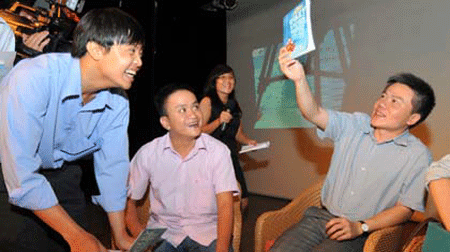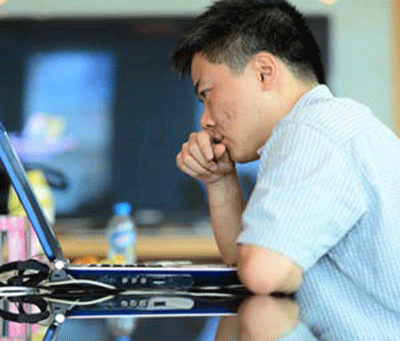Professor Ngo Bao Chau: Don't boss young scientists around
More than 100 questions from readers were sent to the online exchange program with Professor Ngo Bao Chau and writer Nguyen Phuong Van (co-author of the work Ai va Ky o xu xuan nuoc trong nuoc, considered the first "mathematical novel" in Vietnam).

Professor Ngo Bao Chau (right cover) interacted with readers at the Idecaf hall, Ho Chi Minh City on the afternoon of August 31 - Photo: MINH DUC

Professor Ngo Bao Chau answers readers' questions - Photo: THANH DAM
With the standard working style of a scientist, Professor Ngo Bao Chau carefully read the questions and personally typed the answers for readers.
Answering a reader's question about his failure, Professor Ngo Bao Chau confided: "The time right after defending his doctoral thesis was quite difficult for me. That was the time to start a new research direction. Although I had a full degree, my expertise was still very limited. Some research plans could not be implemented. Some of the results I made were not highly appreciated by the community. But during that period, I also learned many things: One is to constantly study to improve myself, and two is to be steadfast in my plans."
Solving a difficult problem: always think about it
Professor Chau shared his experience about losing faith in life: "Sometimes the faith of friends, colleagues and especially family members in us makes us regain our faith."
A 17-year-old reader said he really likes studying subjects that focus on thinking and calculation, but doesn't know how to concentrate when solving exercises. Professor Chau said: "To research and solve a difficult problem, you probably have to think about it all the time. Thinking about it even when doing other things, that's why mathematicians are often called absent-minded. Thinking about it takes a long time, but the time of high concentration is actually not very long. Few people have the ability to concentrate continuously, like I don't have that ability." Regarding the question "How do you evaluate math textbooks in high schools today?", Professor Ngo Bao Chau commented: "In my opinion, textbooks may have some problems here and there, but overall they are not bad. The problem is how teachers teach."
On this occasion, Professor Chau "revealed" the book project "Open Door": "This bookshelf focuses on translating classic works of literature, philosophy and science. The target audience is mainly young people. We are concerned with translating and publishing these books because we believe that they convey universal values of humanity. Those subtle thoughts, perceived will be the luggage we carry with us throughout our lives."
Concerns about Vietnamese education
"Most parents are very worried about their children's studies at school. Many people complain about negative phenomena at school. Whether the truth is completely true as the complaints of parents or not, we still have to let the education sector debate again. But the anxiety of society is real and that alone is the reason for the education sector to look back at itself, to reform itself" - with the question: "What do you think about Vietnam's education system?
Regarding the issue of part-time training and many agencies not recruiting part-time students, Professor Chau frankly said: "Part-time training in our country seems to be distorted because its motivation does not come from the intrinsic needs of the job, from the self-improvement but from what people call standardization of degrees. Perhaps the administrative binding of promotion to possessing degrees is the cause." He concluded: "Evaluating human capacity is very difficult, it cannot be simplified to the matter of possessing a number of degrees."
Stopping for a long time on the question of using talented people, Professor Ngo Bao Chau wrote: "It is true that there are too many young scientists who have to waste their time and energy to overcome administrative barriers that we ourselves have set. Besides improving living and working conditions, I think we have to change the way we think and work to save time for young staff. Do not consider young lecturers and young scientists as objects to be ordered around anymore."
Many questions are not easy to answer
The online exchange ended at 12 o'clock. Although he had to leave immediately due to tight working hours, Professor Ngo Bao Chau still took 5 more minutes for a short interview:
* How do you feel after interacting online with readers?
- There were many questions sent by readers but I think slowly so I could not answer many. Many questions were very good and not easy to answer. After the exchange session, there were still many questions that I had not answered, not because I was not interested or could not answer, but to answer those questions thoroughly would require more time while the exchange session was only two hours. Later, when I have the opportunity, I will rewrite the issues that Tuoi Tre readers are interested in on another occasion, more fully and specifically.
* Recently, you have had many opportunities to meet and work with young Vietnamese people. What do you think about their working style and ideals?
- It's a bit difficult to say in general, and I don't like to make subjective comments. I would like to talk about the students in the class at the Institute for Advanced Study in Mathematics (taught by Professor Chau - PV), I see that they study better than I initially expected, both in terms of working ability, thinking style and learning results.
* Since winning the Fields Medal and becoming the scientific director of the Institute for Advanced Study in Mathematics, have research and teaching activities in mathematics in Vietnam improved, Professor?
According to Tuoi Tre-M






